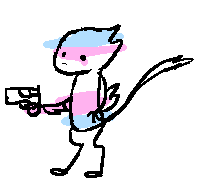Kepori: Difference between revisions
m (Important update) |
m (minor grammatical fix) |
||
| Line 26: | Line 26: | ||
'''You might…''' | '''You might…''' | ||
* Feel uncomfortable in the cold of most ship environments | * Feel uncomfortable in the cold of most ship environments. | ||
* | * See your crew-mates or other coworkers as another species might view family members. | ||
* Worry about the ecological impact of your actions more than others might | * Worry about the ecological impact of your actions more than others might. | ||
*Woop when scared or excited | *Woop when scared or excited. | ||
'''Others probably…''' | '''Others probably…''' | ||
* Presume you to be more loyal than other species | * Presume you to be more loyal than other species. | ||
* Take care to not bump into you too hard, and expect you to be fast and nimble | * Take care to not bump into you too hard, and expect you to be fast and nimble. | ||
* Try to learn whether you’re from north or south Teceti in order to know whether or not to leave you alone. | * Try to learn whether you’re from north or south Teceti in order to know whether or not to leave you alone. | ||
=== Kepori Naming === | === Kepori Naming === | ||
Revision as of 16:58, 3 December 2021
Kepori are a raptoroid species covered in feathers vaguely reminiscent of Earth (Sol)’s extinct Troodontidae. They’re small and sometimes seen as weak by other species due to their hollow bones but as a result are quite quick and nimble on their feet. Those found in space usually lack a clutch, commonly known as rollaways.
Lore
Kepori have had a storied history, beginning on the arid planet of Teceti not entirely dissimilar to many other species’ origins. They arose as one of the largest animals on their planet, as due to the sparse vegetation, most animals ended up being quite small.
The most notable point of history for an outsider to know was late into their industrial revolution, which, due to a runaway greenhouse gas effect, heated the planet to the point a wide band across the equator that was impassable until specialized insulation had been developed. This split their slowly uniting society into two, with the north being more sparsely populated and agrarian, and the south continuing development of industrial technology, although with a much warier eye on the environment.
The two halves have only fairly recently reunified, much to the chagrin of the northerners, with said northerners still maintaining their isolationist behaviours, while southerners are generally more gregarious although less loyal to small groups.
Playing a Kepori
While at first a Kepori may seem extremely weak due to taking much more damage than other species due to their hollow bones, they more than make up for this with their incredible speed. They are well-adapted to much higher temperatures, but as a result are very vulnerable to cold temperatures. Their evolved beak can be used to hold many small items.
You might…
- Feel uncomfortable in the cold of most ship environments.
- See your crew-mates or other coworkers as another species might view family members.
- Worry about the ecological impact of your actions more than others might.
- Woop when scared or excited.
Others probably…
- Presume you to be more loyal than other species.
- Take care to not bump into you too hard, and expect you to be fast and nimble.
- Try to learn whether you’re from north or south Teceti in order to know whether or not to leave you alone.
Kepori Naming
Kepori names usually consist of two or three short syllables, examples include: Meleri, Temiti, Nirena, Minele, Natari.
Adventurers
Because of the poor situation on their home planet, many Kepori have taken to the stars in order to eke out a better existence among the stars. While the situation on their planet has improved somewhat due to advancements in terraforming technology, many descendants of the initial refugees remain in space.
